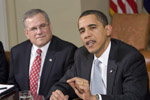
For far too long, members of the Obama administration have claimed that the United States has no leverage with the government of Sudan. This belief has in recent years defined U.S. strategy towards the country and caused tremendous rifts between some members of the administration—a divisiveness that has weakened U.S. policy, ultimately making the lack of leverage a self-fulfilling prophecy.
Today, the Woodrow Wilson International Center for Scholars published a paper entitled, “Avoiding the Train Wreck in Sudan: U.S. Leverage for Peace” as part of its Sudan Working Group Series. The paper, which was written by Enough Co-founder John Prendergast and myself, addresses the commonly-held U.S. administration view that the United States has no leverage in Sudan. In the paper, we argue that the U.S. not only has existing leverage that it is underutilizing, but also areas in which it could create additional leverage to ensure more positive outcomes for the people of the country.
In order to strengthen its position, the Obama administration should ensure that it is presenting a unified and coordinated policy, both in the press and in negotiations. This policy should be sanctioned at the highest levels and supported by a team of full-time, experienced diplomats on the ground and in negotiations. This is perhaps the only way that the U.S. can demonstrate to the Sudanese government that it intends to see peace in Sudan – and the only way that it can convince the government that a lack of change will in fact lead to negative consequences, not just talk of them.
In this same vein, it is important to note here that, while our paper addresses how the U.S. can better engage in negotiations with the government of Sudan, the international community as a whole should be taking heed. Recent meetings with a variety of actors in Sudan revealed that the international community’s greatest weakness at this moment is its inability to form a united front in its dealings with the government of Sudan. Clashes of personality and lack of coordination only weaken the international community’s stance and allow room for the government to continue manipulating negotiations for their own ends. The international community would therefore be wise to pull together and make clear that they are unified in their commitment to seeing change in Sudan – even if it’s not entirely true.
If the U.S. and the international community don’t quickly realize the link that exists between the image they are presenting and the leverage that they possess, there doesn’t seem to be much hope that the current negotiations will bring change for the people of Sudan.
To read the paper, click here.
Photo: President Barack Obama with U.S. Special Envoy to Sudan Major General Scott Gration. (AP)

